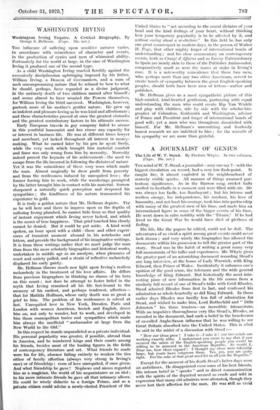WASHINGTON IRVING
Washington Irving Esquire. A Critical Biography. By George S. Hellman. (Cape. 16s. net.) Tim influence of suffering upon sensitive natures varies, in accordance with coincidence of character and events, in the production of cynics and men of whimsical ability. Fortunately for the world at large, in the case of Washington Irving it produced one of the second type.
As a child Washington Irving reacted forcibly against the excessively disciplinarian upbringing imposed by his father, William Irving. a Deacon of Covenanters, and a man of such uncompromising nature that he refused to bow to what he should, perhaps, have regarded as a divine judgment, in the untimely death of two children named after himself ; and seems almost to have wearied the Powers themselves, for William Irving the third survived. Washington, however, partook more of his mother's gentler nature. He grew up as indolent and pleasure-loving as he was kind and affectionate ; and these characteristics proved at once the greatest obstacles and the greatest contributory factors to his ultimate success.
Early European travels in gay company failed to arouse in this youthful humourist and bon viveur any capacity for or interest in business life. He was at different times lawyer and merchant, yet lacked throughout all interest in money- making. What he earned later by his pen he spent freely, while the very work which brought him material comfort and fame was only wrung from him by necessity. Necessity indeed proved the keynote of his achievement—the need to escape from the ills incurred in following the dictates of nature Yet it was the coincidence of these very woes which made the man. Almost magically he drew profit from poverty and from the restlessness induced by unrequited love ; the former forcing him to work, while the wanderings prompted by the latter brought him in contact with his material. Sorrow sharpened a naturally quick perception and deepened his sympathies ; the kindliness of his nature transmuted his experience to gold.
It is truly a golden nature that Mr. Hellman depicts. Try as he will here and there to impress upon us the depths of suffering Irving plumbed, he cannot hide from us that quality of instant enjoyment which Irving never lacked, and which is the secret of true happiness. That grief touched him closely cannot be denied. But it could be put aside. A kind word spoken, an hour spent with a child—these and other experi- ences of transient moment abound in his notebooks and letters, and provide the background of his imaginative writings. It is from these writings rather that we must judge the man than from the more scholarly biographies and historical works, undertaken in middle age as an anodyne, when pleasures of court and society palled, and a strain of reflective melancholy displaced his early gaiety.
Mr. Hellman throws much new light upon Irving's restless melancholy in the treatment of his love affairs. He differs from previous biographers in thinking no shame of his hero on this count ; nor does he attempt to foster belief in the myth that Irving remained all his life fast-bound to the memory of his earliest, and perhaps tenderest, affection— that for Matilda Hoffman, whose early death was so great a grief to him. The problem of his restlessness is solved at last. Unrequited love in New York, Dresden, Paris and London with women American, Scotch and English, drove him on, not only to wander, but to work, and developed in him those cosmopolitan tastes and sympathies which made him always the unofficial " ambassador at large from the New World to the Old."
In this respect he stands unparalleled as a private individual. His personal popularity was greater, if possible, abroad than in America, and he numbered kings and their courts among his friends, besides most of the leading figures in the fields of contemporary literature and art. What friends he made were his for life, absence failing entirely to weaken' the ties either of family affection (always very strong in Irving's case) or of friendship ; even of love unrequited, if once given. And what friendship he gave ! Nephews and nieces regarded him as a magician, the world of his acquaintance as an idol ; to his more intimate friends he gave all that intimacy allows. He could be wisely didactic to a foreign Prince, and as a private citizen. could advise a newly-elected President of the United States to "'act according to the sound dictates of your head and the kind feelings of your heart, without thinking how your temporary popularity is to be affected by it, and without caring about a re-election." In this field he has only one great counterpart in modern days, in the person of Walter H. Page, that other mighty forger of international bonds of understanding ; and his close commentary on contemporary events, both as Chargé d'Affaires and as Envoy Extraordinary to Spain are nearly akin to those of the Publisher Ambassador, comparatively small as were the issues at stake in Irving's case. It is a noteworthy coincidence that these two men, who, perhaps more than any two other Americans, served to create bonds of sympathy between the great English-speaking peoples, should both have been men of letters—author and publisher.
Mr. Hellman gives us a most sympathetic picture of this high-minded, kind-hearted gentleman, portraying with equal understanding the man who could create Rip Van Winkle and play with children, side by side with the scholar-bio- grapher of Columbus, Goldsmith and Washington, adviser of Prince and President and forger of international bonds of good will ; yet a man who was throughout dissatisfied with himself. For Mr. Hellman's unremitting and fearlessly honest research we arc indebted to him ; for the warmth of his sympathy we are more than grateful.






























































 Previous page
Previous page